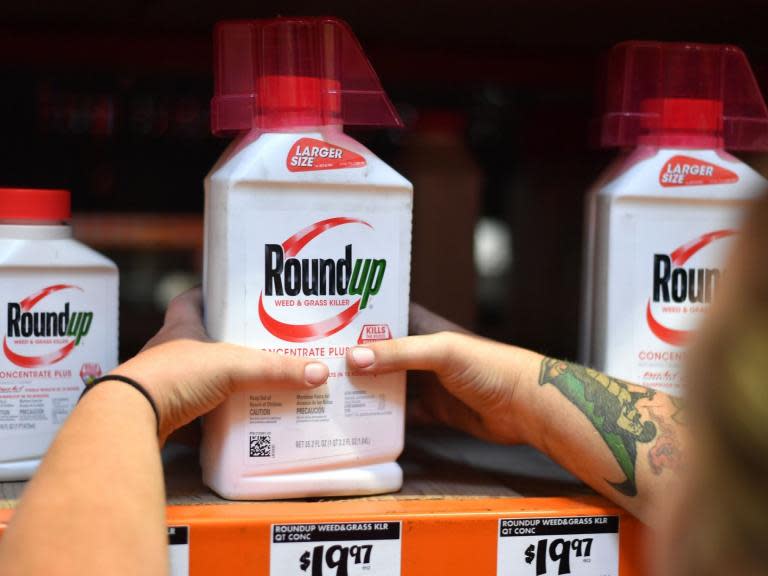Monsanto: Do cancer payouts and global protests signal the end for this agrochemical company?
On Sunday, hundreds of “March Against Monsanto” rallies are expected around the world. The campaign group of the same name behind the protests aims to “educate the world about the crimes Monsanto has committed against humanity”.
The marches – which attract people in their millions – are in their eighth year.
For decades Monsanto has been seen as the number one villain by activists concerned about the impact of herbicides and GM crops.
The controversy started in 1962 when the US-based agricultural biotechnology corporation became a key supplier of the chemical weapon Agent Orange, which was used by the US military with devastating effect during the Vietnam War.
In 1974 Monsanto put Roundup on the market.
The herbicide – which contains glyphosate – was advertised as good at killing weeds and safe to use, a claim which has since caused global controversy. The weedkiller is used all over the world and brings the company in billions each year.
In 1996 Monsanto was one of the first companies to grow GM crops and today it is the largest producer of genetically engineered seeds on the planet, accounting for around 90 per cent of the total market.
But in 2015 a small but hugely significant ruling was made by the World Health Organisations’ International Agency for Research on Cancer (IARC) – researchers found that glyphosate was “probably carcinogenic”.
This opened the floodgates for people claiming exposure to the herbicide had caused their cancer. Farmers, gardeners and groundspeople all over the world claimed the herbicide had made them or their loved ones sick.
The first was Californian groundskeeper DeWayne Johnson, who was awarded a $289m (£227m) payout from Monsanto for contracting terminal cancer.
And last week, a California jury awarded its greatest blow to the company yet – a $2bn payout to a couple who both claimed Roundup had given them cancer.
Claimants say the company failed to warn them of the herbicide’s cancer risk. Monsanto’s lawyers say the weedkiller is safe and say the cases against them are based on “junk science”.
So who’s right?
The fact that Roundup is “probably carcinogenic” does not mean it caused the cancer of these individual claimants. In 2017 the European Food Safety Authority also assessed glyphosate and said that actual exposure levels did not present a public health risk.
“This study considered much of the same evidence as the International Agency for Research on Cancer, but interpreted it differently,” according to Professor Richard G Stevens from the University of Connecticut.
“Specific causation” for cancer can almost never be proved, Professor Stevens wrote in a piece for The Conversation.
“Heavy smoking greatly increases risk of lung cancer, but it is impossible to prove that an individual smoker’s lung cancer was due to smoking, since even lifelong non-smokers sometimes get lung cancer.” he said. “There is no reliable laboratory test to identify the specific cause of an individual cancer.”
However, Monsanto has also been found to have questionable involvement in scientific papers. Plaintiffs argued the company had led a “prolonged campaign of misinformation to convince government agencies, farmers and the general public that Roundup was safe”.
Monsanto was linked to a scientific review that countered the 2015 IARC paper that found glyphosate was a probable human carcinogen. A number of other cases emerged about Monsanto’s undeclared involvement in scientific publications.
Some academics believe Monsanto’s bad reputation came back to bite it: “It’s possible the animus towards Monsanto and genetically modified organisms may have influenced the recent juries’ decision far more than any science,” said Dr Ian Musgrave from the University of Adelaide.
As a result of high-profile trials, Los Angeles County has halted use of Roundup until clearer evidence is available.
Monsanto could follow the path of what is now the Johns Manville company, which started manufacturing asbestos-containing products in the 1880s, according to Professor Stevens.
“After many epidemiological studies showed that exposure to asbestos caused very high rates of lung cancer – primarily pleural mesothelioma – and much litigation, the company went bankrupt in 1982.
“Its assets were reorganised to form the Manville Trust, which allocates monetary damages to people harmed by asbestos,” he said.
It’s too soon to know if Monsanto lawsuits will have any impact or radically change how Roundup is used.
However, 70 per cent of the company’s sales come from its 1,700 patented seeds.
In the US, 90 per cent of corn, soybeans, cotton and sugar beet are GM. The vast majority of these are grown from Monsanto’s patented seeds.
Despite concern about the company’s herbicide, the demand for GM crops is likely to grow in order to help feed a fast-growing global population.
It looks unlikely this agrochemical giant will be taken down any time soon.

 Yahoo News
Yahoo News 

